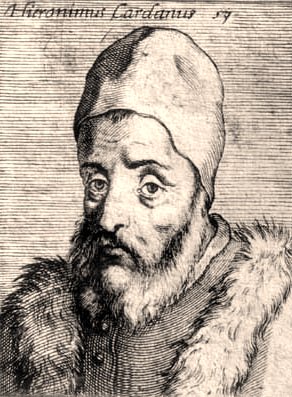Girolamo Cardano
John H. Lienhard presents guest Andrew Boyd
Today, guest scientist Andrew Boyd shares a story of triumph and tragedy. The University of Houston presents this series about the machines that make our civilization run, and the people whose ingenuity created them.
Sixteenth-century physician Girolamo Cardano was not only a Renaissance man in the truest sense, but one of the most colorful figures of his era.
A prolific writer, Cardano produced over 130 printed works and left another 100 unfinished manuscripts at his death. In his autobiography, Cardano described himself as "Hot-tempered, single-minded, and given to women," not to mention "cunning, crafty, sarcastic, diligent, impertinent, sad, treacherous, magician and sorcerer, miserable, hateful, lascivious, obscene, lying, obsequious," and "fond of the prattle of old men."
Cardano's contributions span many fields. A universal joint connecting the gear box to the rear axle of a rear wheel drive car is known to this day by a version of his name -- the Cardan shaft. Cardano is also credited with the invention of the combination lock.
Summoned to treat the Archbishop of Scotland in 1552, Cardano correctly diagnosed feather pillows as the cause of the Archbishop's asthma. Though Cardano was already an established professor of medicine at the University of Padua, the event solidified his reputation as a renowned physician, and helped him secure a list of wealthy patrons and valuable political connections.
Cardano's personal life was filled with tragedy, much of his own doing. Father of three children, his eldest and most beloved son was executed in prison for poisoning his wife, a woman who by all accounts was a despicable character. Cardano's daughter died of syphilis contracted while plying her trade as a prostitute, leading him to write one of the earliest medical treatises on the disease. Cardano himself was imprisoned by the Inquisition for casting a horoscope of Jesus Christ. His second son, a perpetual thief who himself spent many years in prison, was one of Cardano's accusers.
Cardano is best known for his contributions to mathematics, though even here his two greatest achievements have a tragic air. A compulsive gambler who at times lost large sums of money, Cardano drew upon personal experience when writing the first systematic study of probability, work that would directly impact the fledgling insurance industry by providing a basis for quantifying risk.
He also published the first comprehensive solution for finding roots of cubic equations, a solution akin to the quadratic formula we all learn in high school algebra, and far more complicated. At the time, this was an important and quite famous problem. Unfortunately, the publication led to a bitter dispute with Nicolo Tartaglia, who accused Cardano of publishing results communicated in confidence with Cardano's oath never to divulge them. While Cardano's publication made a clear contribution to mathematics, the surrounding controversy will forever cast a shadow on his achievement. Sadly, the event aptly punctuates the story of Cardano's life -- the story of an inventive, colorful man who was above all else, human.
I'm Andy Boyd, at the University of Houston, where we're interested in the way inventive minds work.
Dr. Andrew Boyd is Chief Scientist and Senior Vice President at PROS, a pricing and revenue optimization software firm. Dr. Boyd received his A.B. with Honors at Oberlin College with majors in Mathematics and Economics in 1981, and his Ph.D. in Operations Research from MIT in 1987. Prior to joining PROS, he enjoyed a successful ten year career as a university professor.
O. Ore. Cardano: The Gambling Scholar. Princeton University Press, Princeton, 1956.
P. L. Bernstein, Against the Gods: The Remarkable Story of Risk. Wiley, New York, 1996.
A. Ashworth, Cardano's Solution -- Girolamo Cardano's Works. History Today, January, 1999.
Gerolamo Cardano, accessed October 16, 2004, https://en.wikipedia.org/wiki/Gerolamo_Cardano .
Note that we find variable spellings in use for Cardano's name -- e.g. Cardan and Cardanus. His first name will show up as either Gerolamo or Girolamo.

Girolamo Cardano: 1501-1576